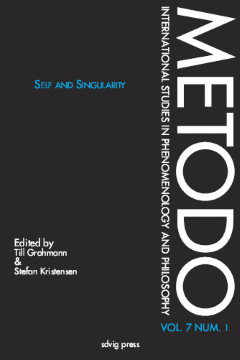Singularity as becoming oneself through others
lessons from Merleau-Ponty, Laing, and anorexia
pp. 37-73
Résumé
Though singularity of the self can be understood in different ways, this essay argues that it ought ultimately to be understood temporally, in terms of becoming and the establishment of what Merleau-Ponty calls «personal institutions». Anorexia is used as a case study: anorexics can oscillate between (a) feeling themselves expressed in their anorexic desires, and (b) feeling themselves expressed in their opposition to anorexic desires. I argue, drawing upon Laing’s understanding of psychopathology, that neither is their «true singular self» but that singularity ultimately realizes itself in the process of this oscillation. Guided by Merleau-Ponty’s concept of «institution», I propose that oscillations result from lived efforts to resolve indeterminately felt existential problems; that the repetitions and «binary rhythm» involved in such oscillations are endemic to personal becoming; and that what enables success rather than failure in such becoming singular are relations with others who act in recognition of this process.
Détails de la publication
Publié dans:
Grohmann Till, Kristensen Stefan (2019) Self and singularity. Metodo 7 (1).
Pages: 37-73
Citation complète:
MacLaren Kym, 2019, Singularity as becoming oneself through others: lessons from Merleau-Ponty, Laing, and anorexia. Metodo 7 (1), Self and singularity, 37-73. https://doi.org/10.19079/metodo.7.1.37.










